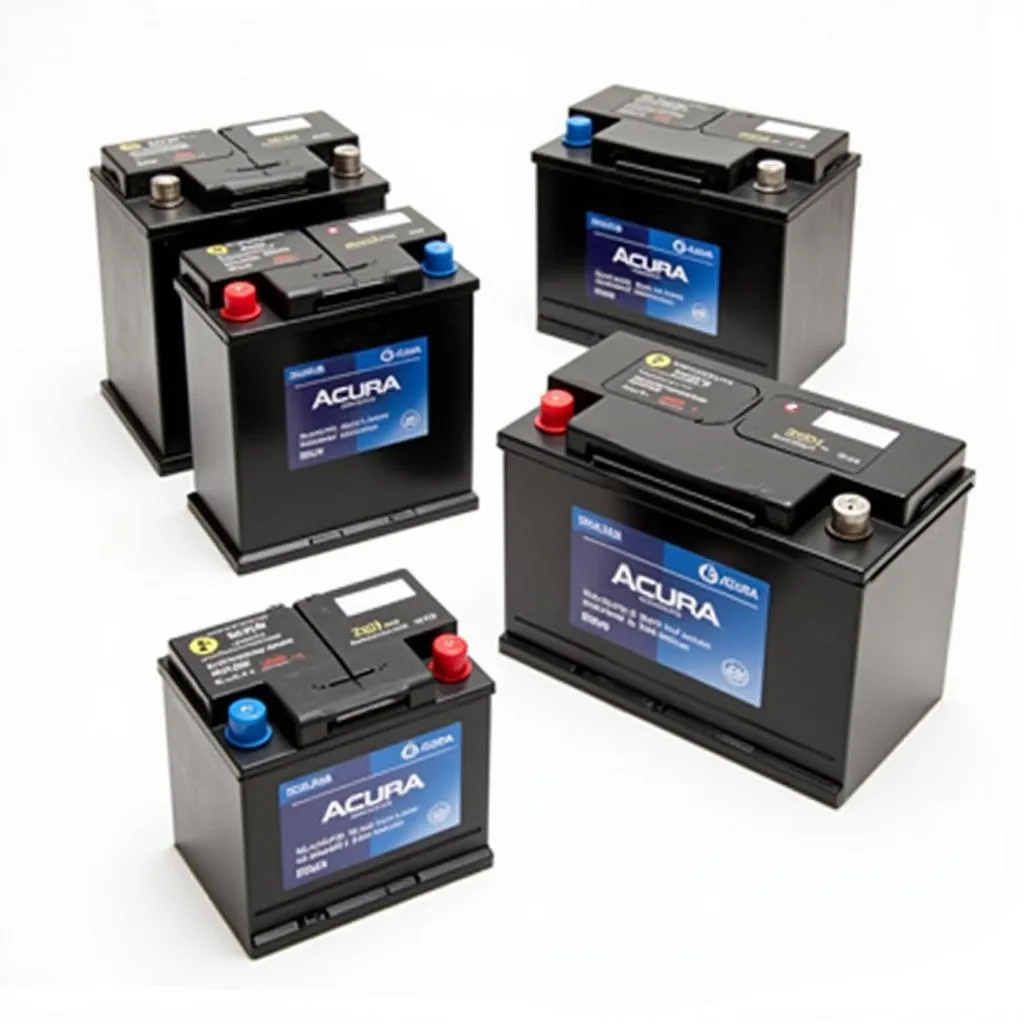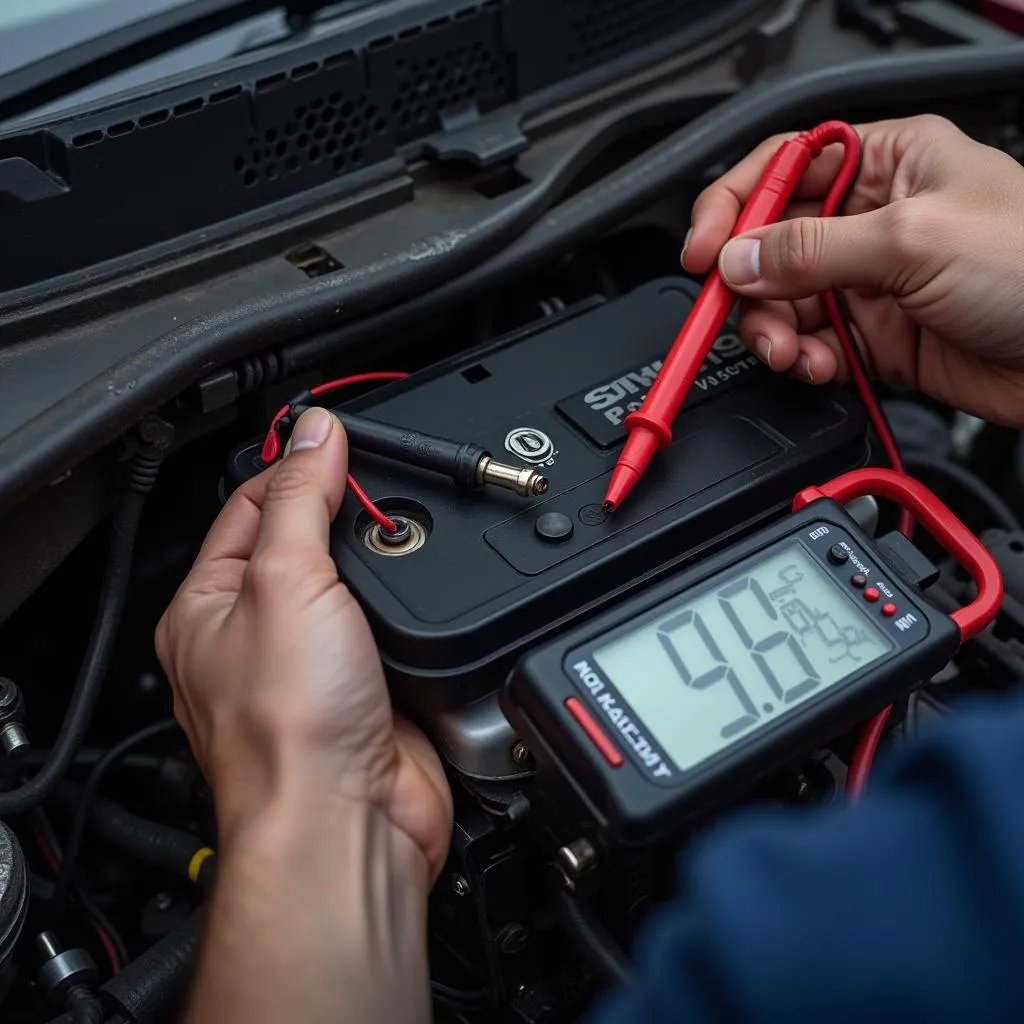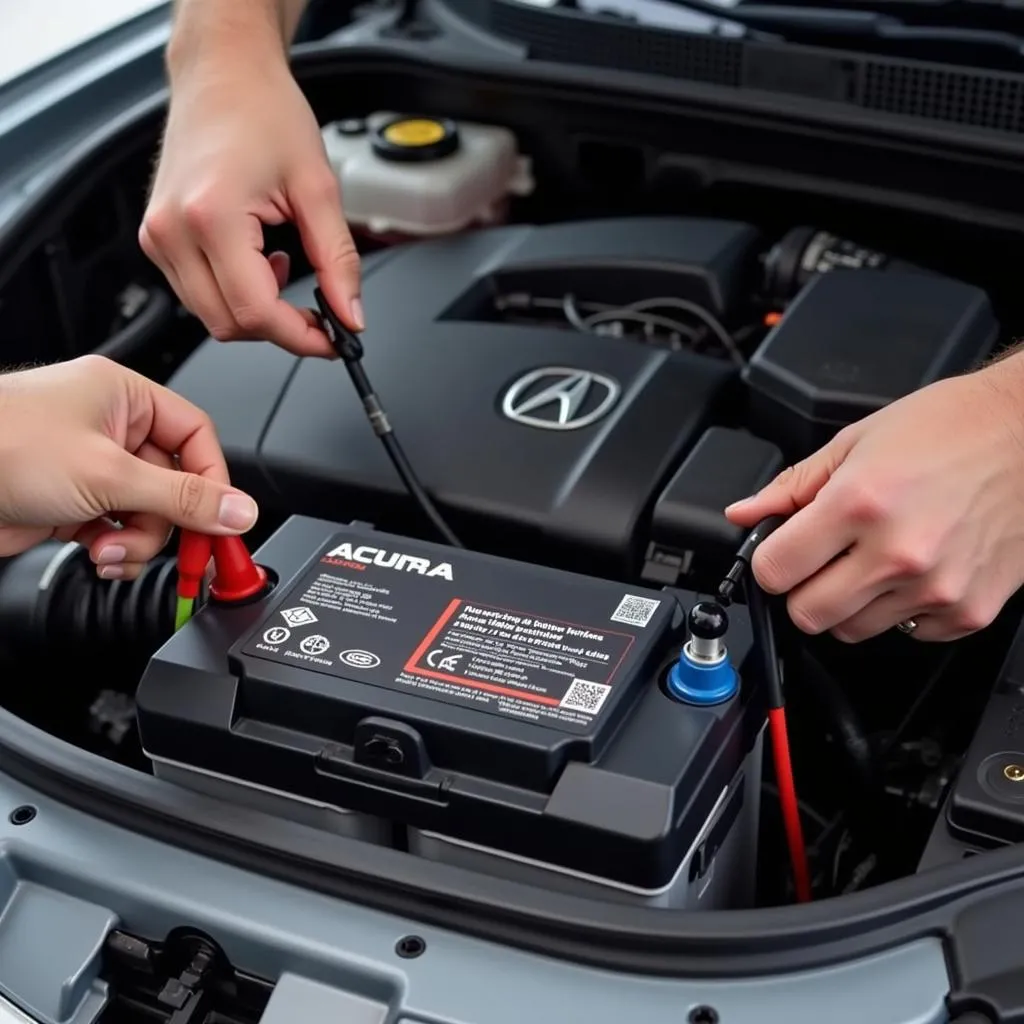The Acura, with its reputation for luxury and performance, relies heavily on a robust battery to power its many electrical components. Your Acura Car Battery is more than just a starter; it fuels everything from the ignition system to the sophisticated electronics that make your driving experience seamless.
 Types of Acura Car Batteries
Types of Acura Car Batteries
Understanding Your Acura Car Battery
Your Acura car battery stores energy and delivers the necessary electrical current to start your engine. It also powers various electrical components, such as lights, radio, and climate control, even when the engine is off. Understanding your battery’s type, maintenance needs, and signs of failure can save you from unexpected breakdowns and costly repairs.
Types of Acura Car Batteries
Acura vehicles typically use lead-acid batteries, similar to most other cars on the road. However, the specific type of battery required for your Acura depends on the model year and engine size.
- Flooded Lead-Acid Batteries: These are the most common type, requiring regular maintenance to check electrolyte levels.
- Valve-Regulated Lead-Acid (VRLA) Batteries: These maintenance-free batteries are sealed and do not require electrolyte checks. They are often found in newer Acura models.
- Absorbent Glass Mat (AGM) Batteries: These high-performance batteries offer superior power and longevity, especially for Acura models with advanced start-stop technology or numerous electrical features.
 Testing Acura Car Battery Voltage
Testing Acura Car Battery Voltage
How Long Does an Acura Car Battery Last?
A typical Acura car battery can last anywhere from 3 to 5 years, depending on various factors like driving habits, climate, and battery maintenance. Extreme temperatures, frequent short trips, and old age can shorten your battery’s lifespan.
Signs Your Acura Car Battery Needs Replacement
Recognizing the warning signs of a failing battery can prevent inconvenient breakdowns. Here are some telltale signs:
- Slow Engine Crank: Your engine takes longer than usual to start.
- Dimming Lights and Electrical Issues: Headlights, interior lights, or other electrical components appear dim, especially during engine start.
- Dashboard Warning Light: The battery warning light illuminates on your dashboard.
- Clicking Sound When Starting: You hear a rapid clicking sound when you turn the ignition key.
- Swollen Battery Case: Physical inspection reveals a bloated or leaking battery case.
Choosing the Right Acura Car Battery Replacement
When it’s time for a new battery, choosing the right one for your Acura is crucial for optimal performance and longevity. Refer to your owner’s manual for the recommended battery group size and type.
Key Factors to Consider:
- Battery Group Size: Ensures proper fitment in your Acura’s battery tray.
- Cold Cranking Amps (CCA): Measures the battery’s ability to start your engine in cold weather. Higher CCA ratings are essential for colder climates.
- Reserve Capacity Minutes (RC): Indicates how long the battery can power your vehicle’s electrical components if the alternator fails.
- Brand and Warranty: Opt for reputable brands like Interstate Batteries, Optima, or ACDelco that offer reliable performance and comprehensive warranties.
 Installing a New Acura Car Battery
Installing a New Acura Car Battery
Acura Car Battery Maintenance Tips
Extending the life of your Acura car battery involves simple yet effective maintenance practices.
- Regular Cleaning: Keep the battery terminals clean and free of corrosion using a battery terminal cleaning brush and a baking soda solution.
- Limited Short Trips: Frequent short trips prevent the battery from fully recharging. Try to incorporate longer drives into your routine to allow for proper charging.
- Turn Off Accessories When Not in Use: Avoid draining the battery unnecessarily by turning off headlights, interior lights, and accessories when the engine is off.
- Periodic Battery Testing: Have your Acura’s battery tested at least once a year, especially before the winter months, to ensure optimal performance.
Conclusion
Your Acura car battery plays a vital role in your vehicle’s performance and reliability. Understanding its importance, recognizing signs of failure, and following proper maintenance practices can help you avoid unexpected breakdowns and ensure a smooth and enjoyable driving experience. Remember to consult your owner’s manual or a qualified Acura technician for specific recommendations tailored to your vehicle’s model and year.
FAQs about Acura Car Batteries
1. Can I replace my Acura car battery myself?
While it’s possible to replace your Acura battery yourself, it’s recommended to seek professional assistance. Acura vehicles often have complex electrical systems, and improper installation can lead to damage or safety hazards.
2. How much does a new Acura car battery cost?
The cost of a new Acura car battery can range from $150 to $300 or more, depending on the battery type, brand, and place of purchase.
3. How often should I have my Acura car battery tested?
It’s a good practice to have your Acura car battery tested at least once a year or whenever you experience starting issues or electrical problems.
4. What happens if my Acura car battery dies while driving?
If your Acura car battery dies while driving, your engine will eventually stall. However, your vehicle’s alternator should provide enough power to keep your essential electrical components functioning for a short period. It’s crucial to pull over to a safe location as soon as possible.
5. Can a dead Acura car battery be recharged?
Yes, a dead Acura car battery can often be recharged using a battery charger. However, if the battery is old or severely discharged, it might not hold a charge effectively and might require replacement.
Looking for more information on maintaining your Acura? Check out our article on the best low maintenance luxury cars.
Need Assistance With Your Acura’s Battery?
For any Acura car battery concerns or if you need expert assistance, don’t hesitate to contact us! Our team of Acura specialists is here to help 24/7.
WhatsApp: +1(641)206-8880
Email: [email protected]
Visit Us: 276 Reock St, City of Orange, NJ 07050, United States.
